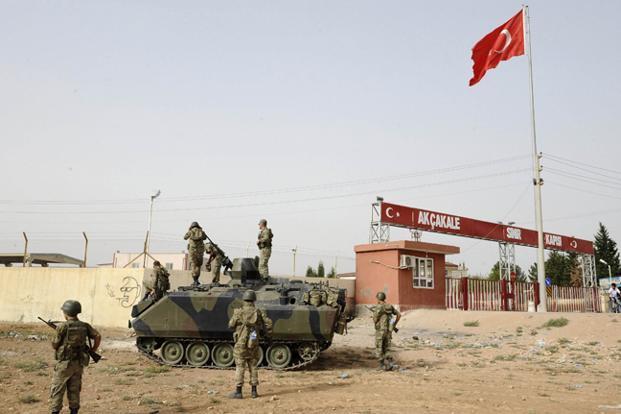Turkey, NATO’s neighbour to the Islamic State reversed its former stance on military action last night and has voted to join the coalition of nations attacking ISIS. The decision has been taken against a background of complex conflicting interests and competing local considerations that may continue to hold up effective intervention from the nation in the near future.
The move means Turkey, which has one of the largest armies in the world, may come to deploy a significant force across the border to combat the Islamic State which has laid claim to Turkish territory as part of the greater caliphate and is now only miles from the border. It could also allow allied nations to launch air strikes from Turkish air bases close to the Iraqi and Syrian borders, reports The Guardian.
For the RAF, being able to fly out of Turkish bases or even airports in the south east of the country instead of RAF Akrotiri in Cyprus could more than halve the distance flown by Tornado fighter bombers. Relocation could significantly reduce fuel costs, negate the need for air-tankers and boost the amount of time fighters spend in combat and in support of fighters on the ground rather than in transit, overflying Iraq.
The Turkish government has resisted pressure from its allies to become formally involved until this point because of specific concerns and requirements it holds that are not necessarily shared by other alliance members, and despite the vote many of these have yet to be resolved. One of the main areas of contention is the Kurds, who are one of the main groups opposing ISIS in Iraq.
Although talk of Kurdistan, its army and importance in the conflict is often spoken about, it remains an internationally unrecognised nation whose natural territory stretches from Turkey, through Syria and Iraq to Iran. It is these territorial claims within Turkey that makes them extremely unlikely allies, and the Turks are known to be very uncomfortable with the idea of arming the Kurds.
The flow of modern weaponry from the European Union and the United States to the Kurds may be storing trouble up for Turkey in the future, and an independent Kurdistan could set a precedent for natural, ethnic states that could cause regional instability in the Middle East, North Africa and beyond.
Another yet to be resolved problem is the matter of military strategy against ISIS. While the present alliance which includes the United States, the United Kingdom, and France is dedicated to remote airstrikes and avoiding direct military intervention at all costs, newcomers Turkey see this as short-termist and prone to failure.
As defeating Assad’s rump Syrian state remains one of Turkey’s main priorities, they are more likely to want to use air power to enforce a no-fly zone over Syria, to protect their own troops from counter-attack from what remains of the Syrian air force.
Domestic politics have also played a role in the delay to Turkey’s military involvement, as the opposition Republican party (CHP) have opposed intervention. Using United Nations observers reports of the atrocities committed by ISIS released hours before the vote, Turkish Prime minister goaded his opponents into supporting the action, telling members of parliament “If CHP votes ‘no’ to the motion, history will remember the party as being on the side of ISIS”. The motion was passed 298-98 last night.

COMMENTS
Please let us know if you're having issues with commenting.